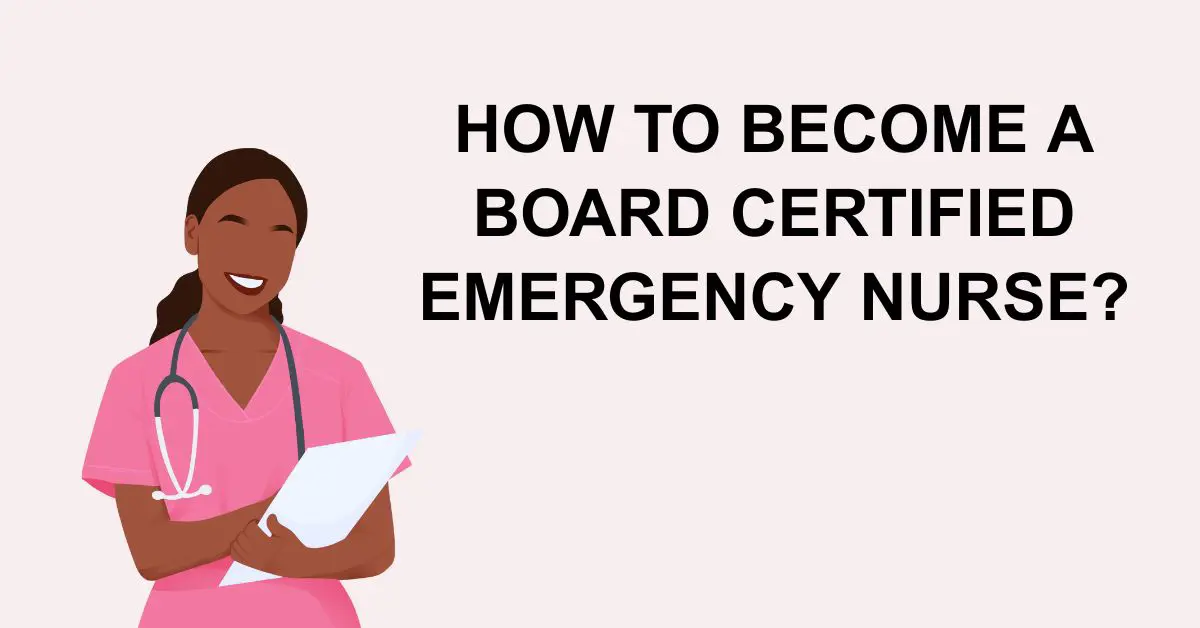How to become a certified emergency nurse?

Becoming a Certified Emergency Nurse (CEN) is an excellent way to advance your nursing career and gain a professional edge in emergency care. Whether you’re new to nursing or have already started working in the field, earning this certification can lead to better job opportunities, higher salaries, and the personal satisfaction of knowing you’ve achieved a significant milestone in your profession. This article will break down the steps needed to become a certified emergency nurse, from the educational requirements to passing the CEN exam.
What Does a Certified Emergency Nurse Do?
Certified Emergency Nurses play a large role in healthcare, particularly in hospital emergency departments. They are responsible for treating patients with severe injuries, sudden medical conditions, or life-threatening situations. Their work often requires quick assessments, stabilizing patients, and providing both immediate and follow-up care.
Emergency nurses need to think on their feet and excel under pressure since they’re making decisions in fast-paced, high-stakes situations. Certification through the Board of Certification for Emergency Nursing (BCEN) serves as formal proof that a nurse has the specialized knowledge to handle the demands of emergency healthcare. While the certification isn’t mandatory to work as an ER nurse, many employers prefer candidates who hold the CEN credential because it signals advanced expertise and a strong commitment to this challenging field.
Educational and Licensing Requirements
To begin the path toward becoming a certified emergency nurse, the first step is becoming a registered nurse (RN). This involves completing a nursing program, which can be either a two-year associate’s degree or a four-year bachelor’s degree in nursing. After completing an approved program, candidates must pass the NCLEX-RN exam, which is the licensing test for registered nurses.
Those pursuing emergency nursing careers can benefit greatly from classes or clinical rotations that focus on acute and emergency care. Early exposure to these areas helps build a solid foundation for the high-pressure environments these nurses will face. While some may pursue advanced degrees or certifications in related specialties, these are not required to attempt the CEN exam.
Once a nurse has earned RN credentials, they can begin gaining practical work experience in emergency settings. The BCEN encourages nurses to have at least two years of experience in this field before sitting for the CEN exam, though it is not required. Nurses holding a valid, unrestricted RN license are eligible to take the exam, no matter how long they’ve been working in emergency care.
Preparing for the CEN Exam
The Certified Emergency Nurse (CEN) exam evaluates a nurse’s knowledge and decision-making skills across various emergency care topics. While the certification isn’t required for employment in emergency nursing, it is widely regarded as one of the best ways to step up your career and enhance your professional profile.
The CEN exam features 175 multiple-choice questions, of which 150 are scored. The remaining 25 questions are unscored trial items. Candidates are allotted three hours to complete the computer-based test. A passing score requires answering at least 106 of the 150 scored questions correctly, a success rate of roughly 71%. Although there is no limit on the number of times a candidate can take the exam, there is a 90-day waiting period between attempts.
To prepare for the exam, a wide range of study materials is available, including practice tests, review guides, and online courses tailored to the comprehensive nature of the test. These resources cover topics like cardiovascular and respiratory emergencies, toxicology, and infectious diseases. Study groups are another popular method, as they foster collaboration and shared insights when tackling difficult concepts.
The cost of taking the exam varies based on membership in the Emergency Nurses Association (ENA). The fee is $230 for ENA members and $370 for non-members. Retakes and recertifications also carry fees, so it’s a good idea to set aside funds for these potential expenses alongside your study plan.
Maintaining Your Certification
After earning the CEN credential, nurses are required to keep it current. This is done through the renewal process, which is necessary every four years. Maintaining certification ensures that nurses remain knowledgeable about new practices and approaches in emergency care.
To renew their CEN status, nurses must meet continuing education requirements and either reattempt the exam or fulfill renewal criteria set by the BCEN. Actively pursuing professional development opportunities and staying up-to-date with advancements in emergency nursing practices make this process smoother. Since technology and treatments in healthcare evolve rapidly, these updates help certified nurses stay ahead in their careers.
Employers often favor nurses who maintain their credentials, as it reflects dedication to career growth and keeping up with medical advancements. This step isn’t just an administrative process; it’s also an opportunity to reinforce your confidence and professional standing in the emergency care field.
The Benefits of Becoming a CEN
Achieving CEN status brings many advantages to a nurse’s professional life. Employers in emergency care settings often give priority to certified candidates when filling specialized positions. Certification also shows potential for earning higher wages, as many hospitals and facilities value the skills and commitment that come with it.
Beyond the job-related perks, CEN certification often boosts self-assurance. Passing the exam means you’ve proven your capabilities across the broad spectrum of emergency healthcare topics, which can make you feel more equipped to tackle the diverse challenges of the field. This sense of accomplishment is not only validation of your hard work but also serves as added resilience when confronting the unpredictability of emergency care.
Embarking on this journey is an investment in your future, and it can open up pathways to roles and responsibilities that might feel out of reach otherwise. If you thrive in quick-paced environments and enjoy providing critical care during moments that truly matter, obtaining CEN certification offers an excellent means of reaching your goals.
Interested in contributing to our blog or partnering with us? Want to share your story of how Crucial Exams helped you? Contact Us .